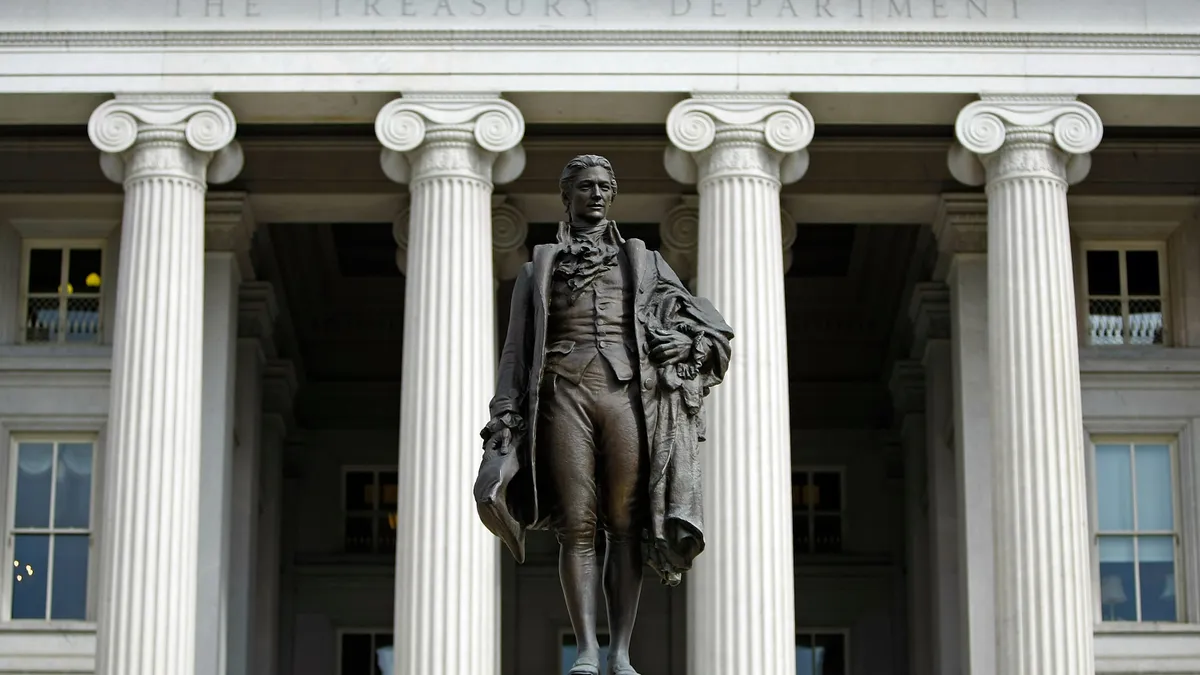Dive Brief:
- Amid a rush of actions taken on the first day of President Donald Trump’s second term, a Monday presidential memorandum signaled that the U.S. would effectively be pulling out of any agreements it made with regard to what it called the “global tax deal” of the Organization for Economic Co-operation and Development, an intergovernmental organization.
- The memorandum ordered the secretary of the treasury working along with the U.S. trade representative to inform the OECD that any commitments made by the Biden administration “have no force or effect in the United States.” David Lebryk, the fiscal assistant secretary of the treasury, is currently the acting treasury secretary with Trump’s nominee for treasury secretary, hedge fund manager Scott Bessent, still awaiting full Senate approval.
- Separately, the order also went on the offensive, directing the treasury secretary to investigate whether any foreign countries are not complying with U.S. tax rules or agreements, or any that are or are likely to put rules in place that “disproportionately affect American companies,” according to the memorandum. Findings and recommendations including proposed protective measures are to be delivered to the Trump within 60 days.
Dive Insight:
Former Treasury Secretary Janet Yellen was a key force behind talks led by the OECD that resulted in more than 130 countries agreeing to implement global tax rules, including so-called Pillar 2, which sought to set a global minimum effective tax rate of 15%, CFO Dive previously reported. The approach was partly aimed at discouraging tax havens and keeping companies from locating headquarters in the lowest-tax nations.
But it failed to gain momentum in the U.S., in part due to pushback from Republican lawmakers, some of whom argued that it would undermine the country’s competitiveness and discourage investment in the U.S., CFO Dive previously reported.
Trump’s move against the OECD is not surprising, but it indicates that the global minimum tax agreement will not move forward in the U.S. without Congress taking action, Kevin Jacobs, a managing director and the national tax office practice leader at Alvarez & Marsal Tax.
“It’s not necessarily that we’re fully backing out, it is that we’re requiring Congress to agree to the deal, to which previously the U.S. was viewed as one of the driving forces,” Jacobs said in an interview. “They’re sending a clear message that, ‘we want to revisit the commitments that were made’...Like many things, it’s a waiting game to see what all the implications of it are.”
The portion of the order that calls for investigating other countries’ tax rules was more surprising to Jacobs. “It did catch many people off guard, especially being a day-one provision,” he said.
Separately, Aruna Kalyanam, Big Four accounting and consulting firm Ernst & Young’s global tax policy leader, noted the memorandum did not reveal any unexpected positions on how the Trump administration will approach OECD policy, according to her comments emailed to CFO Dive. At the same time, the memorandum sets the stage for an investigation into how U.S. companies are treated tax-wise by other countries and “crystallizes what ‘America first’ and ‘American companies first’” will mean for multilateral agreements during Trump’s second term, she said.
“We can expect the Treasury and [U.S. trade representative] to provide methodical analyses of US companies’ reports of the adverse tax conditions they are seeing in their international operations, and, importantly, a list of how the US can and should respond to what they view as anti-US, discriminatory policies,” Kalyanam wrote.
Editor’s note: This story was updated to include comments from Aruna Kalyanam, EY’s global tax policy leader.















